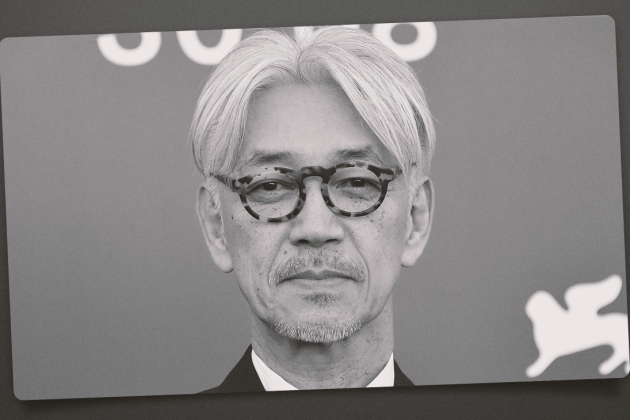Ryuichi Sakamoto, Oscar-Winning Composer, Dies at 71
- Oops!Something went wrong.Please try again later.
- Oops!Something went wrong.Please try again later.
- Oops!Something went wrong.Please try again later.
- Oops!Something went wrong.Please try again later.
- Oops!Something went wrong.Please try again later.

Ryuichi Sakamoto, the Oscar-winning composer, musician, actor, singer, producer, writer and activist from Japan, has died. He was 71.
Sakamoto died Tuesday of cancer, recording company Avex said Sunday in a statement posted to Twitter that thanks his medical teams in Japan and the U.S. and asks for fans to respect the privacy of his family at this time.
More from The Hollywood Reporter
Coslough Johnson, Writer on 'Laugh-In' and Sonny and Cher Variety Shows, Dies at 91
Sharon Acker, Actress in 'Point Blank' and 'Perry Mason,' Dies at 87
Sofia Festival Director Stefan Kitanov on Showing Solidarity With Ukraine at the 2023 Fest
“While undergoing treatment for cancer discovered in June 2020, Sakamoto continued to create works in his home studio whenever his health would allow him to. He lived with music until the very end,” the statement said, noting a private funeral among close family has already taken place.
During a career that saw him score more than 40 films, including The Last Emperor (1987), Merry Christmas, Mr. Lawrence (1983) and The Revenant (2015), Sakamoto also received two Golden Globes, a Grammy and a BAFTA.
Born in Tokyo in 1952 to a clothes designer mother and literary editor father, Sakamoto was surrounded by music, art and culture from a young age. He began playing the piano at age 3 and attended the same famously liberal and creative preschool as Yoko Ono.
While studying at Tokyo University of the Arts, he first came across electronic music. Already working as a session musician before receiving his master’s degree, Sakamoto became a founding member of the seminal Yellow Magic Orchestra trio in 1978.
Continuing to work on solo projects, he released his B-2 Unit album in 1980; the spaced-out synthesized beats and melodies of the track Riot in Lagos were cited by Kurtis Mantronik and Afrika Bambaataa as influences on their early electro and hip-hop productions. He would go on to release more than 20 solo albums.
Nagisa Oshima’s Merry Christmas, Mr. Lawrence marked Sakamoto’s debut onscreen as a film composer and won a BAFTA. (He also starred in the British-Japanese production as a wartime prison camp commandant opposite David Bowie.) David Sylvian of British electronic pop pioneers Japan provided vocals for the Forbidden Colors theme song, and Sakamoto would go on to work with him again, one of the numerous collaborations that marked his eclectic career.
Sakamoto played a Japanese Imperial Army officer again in Bernardo Bertolucci‘s The Last Emperor, which, as with Merry Christmas, Mr. Lawrence, was produced by Jeremy Thomas. The film won nine Oscars, including best picture and director, as well as best original score for Sakamoto alongside David Byrne and Cong Su. It also prevailed in the same three categories at the Globes.
Teaming again with Bertolucci and Thomas on The Sheltering Sky in 1990, Sakamoto won another Globe for that score. In Stephen Nomura Schible’s 2017 documentary Ryuichi Sakamoto: Coda, the composer recalled how Bertolucci had insisted he rewrite a section of the score on the spot while a 40-piece orchestra waited. The pair would reunite on the jury for the 2013 Venice International Film Festival.
In 1992, Sakamoto composed the music for the opening ceremony of the Barcelona Olympics. He would spend the rest of the decade prolifically writing music, working with musicians from around the globe in numerous diverse genres as well as writing scores for Oliver Stone’s ABC miniseries Wild Palms (1993) and Brian de Palma’s Snake Eyes (1998).
In 1999, he improbably topped the Japanese singles charts with a tune from his BTTB album that had been used in a popular energy drink TV commercial. The song, Energy Flow, was the first instrumental to reach No. 1 in Japan.
A longtime political activist, he campaigned against nuclear power and weapons, leading a movement against a uranium and plutonium processing plant in Japan. After the Fukushima meltdowns of 2011, he was a prominent voice in the ensuing anti-nuclear protests.
Sakamoto had a short-lived marriage in his student days, from which a daughter was born, and then married Akiko Yano in 1982. The marriage to Yano, herself an accomplished musician, lasted until they separated in 1992, though they didn’t official divorce until 2006. Their daughter, Miu Sakamoto, became a successful pop singer in Japan.
He began a relationship with his manager Norika Sora in 1990, and they married and had two children.
Diagnosed with Stage 3 throat cancer in June 2014, he was forced to take the first significant break in his career. A little more than a year later, he announced that he had recovered and would work on veteran director Yoji Yamada’s Living With My Mother, which would be Japan’s foreign language entry for the Oscars. That year, he also scored Alejandro González Iñárritu’s The Revenant, receiving Globe, Grammy and BAFTA nominations.
Sakamoto served on the jury at the Berlin Film Festival in 2018 and was awarded Asian Filmmaker of the Year by Busan film festival a few months later.
In summer 2018, it emerged that Sakamoto had found the music so bad at his favorite Japanese restaurant in Manhattan (he had long divided his time between Tokyo and New York) that he contacted the chef and offered to create a playlist. He went on to do the same for a new bar and restaurant the chef opened, without payment or fanfare.
Best of The Hollywood Reporter
